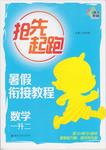题目内容
The opening province which ________ thirteen counties and three coastal cities will quicken its paces of economic development.
A. consists of B. makes up
C. is included D. is contained
练习册系列答案
 南大教辅抢先起跑暑假衔接教程南京大学出版社系列答案
南大教辅抢先起跑暑假衔接教程南京大学出版社系列答案
相关题目
题目内容
The opening province which ________ thirteen counties and three coastal cities will quicken its paces of economic development.
A. consists of B. makes up
C. is included D. is contained
 南大教辅抢先起跑暑假衔接教程南京大学出版社系列答案
南大教辅抢先起跑暑假衔接教程南京大学出版社系列答案